'Our community is being targeted': Savannah trans youth, advocates rally against new law
- Oops!Something went wrong.Please try again later.
Lawrence Appenzeller, director of Savannah’s First City Pride Center, recalled the moment after Georgia SB 140 passed. The law, signed and enacted on March 23 by Gov. Brian Kemp, will ban most gender-affirming surgeries and hormone replacement therapies for transgender and nonbinary people under 18.
He was talking with the parent of an 11-year-old child who’d had plans to start puberty blockers and hormone replacement therapy. Already denied care once in South Carolina, Appellenzer realized the reality that the child would have to go through the emotional process of denial again.
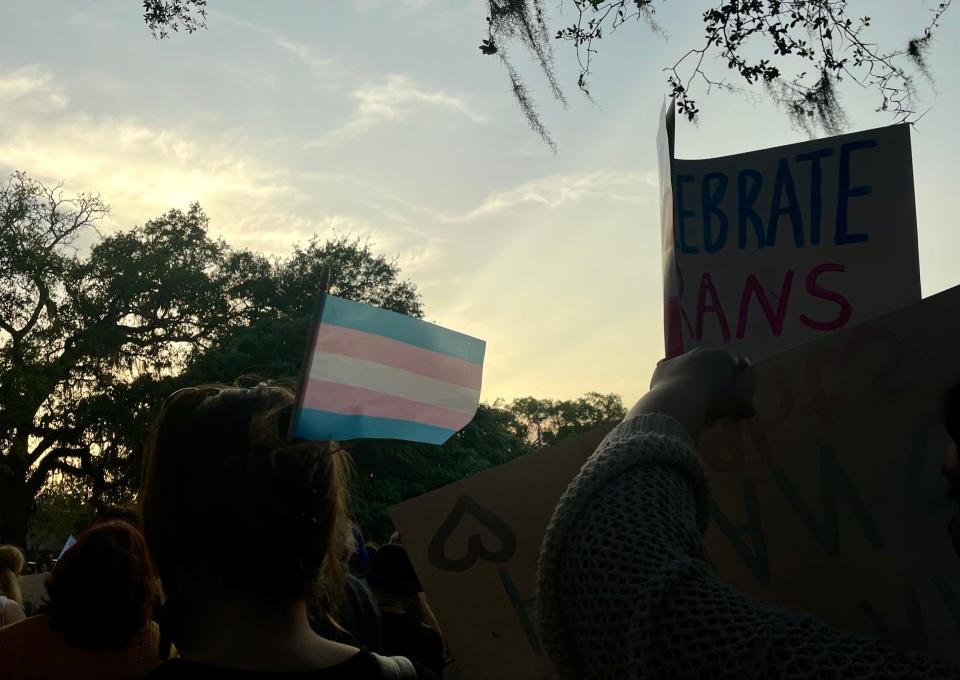
“Said straight up to her mom, ‘I can never go to Texas now. I won't be welcome in Texas. And that's just so incredibly heartbreaking that a child is aware of what's going on to an extent that they think they won't be welcome in certain states,” Appenzeller said.
For supporters of SB 140, it’s a necessary measure to protect children from “undergoing unnecessary and irreversible medical treatment.” For opponents of the bill, it’s a ban on medical treatments that will place trans youth in the path of even more harm.
Gender-affirming care is a model of care and approach that supports an individual’s gender identity through a range of social, psychological, behavioral, and medical interventions. That can include counseling and changes in social expression to medicine such as hormone therapy.
Georgia is the latest state in a slew of states across the country that have passed laws or policies that restrict gender-affirming care for minors, adding to the wave of legislation focused on curbing LGBTQ rights. The bill also states that doctors and health care providers who don’t comply could lose their licenses and potentially be exposed to criminal or civil liability.
In response to the bill, transgender youth and advocates in Savannah came together to speak out against the ban.
“We've also had a lot of parents drop into the center honestly in tears, just asking how they can help, what they can do. They want resources, they want information, they want to support however they can.”
First City Pride Center's youth group coordinator Michele Maclver is the mother of a child who is trans. She said the most important thing parents can do right now is to keep channels of communication open.
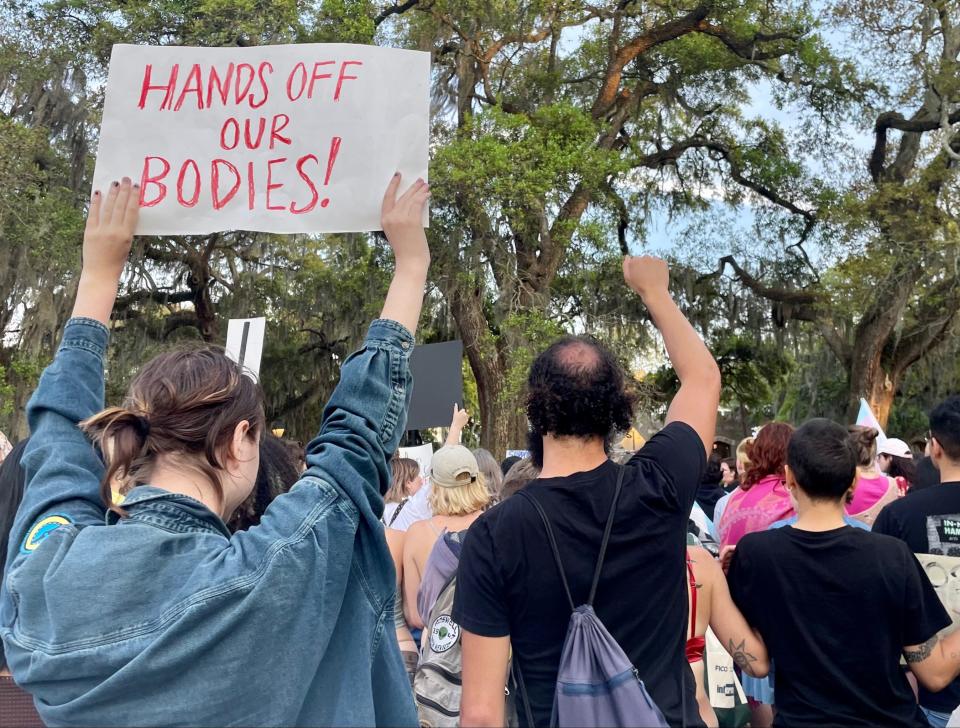
"They need a safe person. If they don't feel comfortable going to their parent, sometimes it might be a sibling or an aunt or an uncle or maybe even a teacher at school, but the big thing is to not be afraid to ask questions about what's happening," Maclver said.
"Everything that we did, we made informed decisions as a family. I hate that these kids are going to have to state shop if they want to get hormone replacement therapy."
More: Authenticity for all: Savannah's first fully queer-owned, operated tattoo shop fosters community
Political science professor: How Americans really feel about transgender people
’I have rights!’ Savannah responds to Supreme Court’s LGBT worker protections ruling
March for Trans Youth Autonomy
Community support translated into a rally for trans youth autonomy on March 30 where nearly 300 gathered — the young, the old, the faithful, the angry.
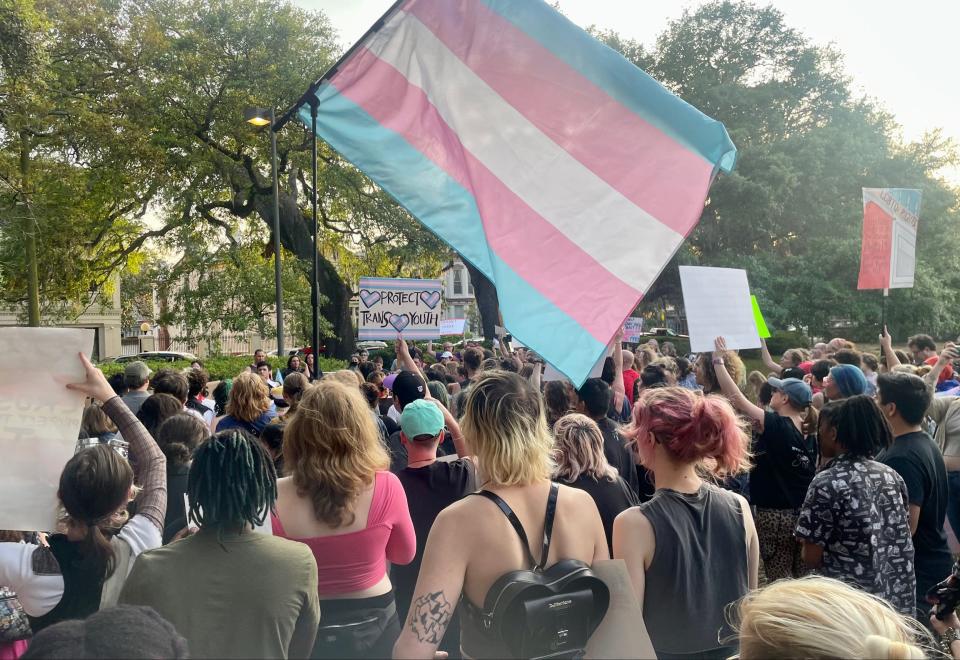
Organized by Pluto Shoop and Simon Von Winkle, the mass of people marched down the spine of Forsyth Park to the fields by the basketball court, lofting pretest signs, many scrawled in the light pink, blue and white of the trans pride flag.
Shoop began the rally by reading the names of murdered trans youth.
His co-organizer stood on the bench they were using as a platform, the crowd squashed between the hedges and the Forsyth Park Fountain, and condemned the legislative attacks on transgender healthcare and rights, including SB 140. The speaker, Simon Von Winkle, said the laws threaten lives.
“I don't want to stare down another casket and lay another trans flag on it. I don't want to see another young trans person taken too soon. I want to talk to my beautiful mother and have her tell me the weird s--t that happens at Target, not that she's been harassed,” Von Winkle said.
More: Teen suing Florida over "Don't Say Gay Bill" visits Savannah for celebration of queer community
“I want to grow to see my wonderful friends find their gender identity and not hide it so they won't be attacked in the streets. I want to look at my little cousin and listen to him tell me about bugs and snakes, not how his classmates called him a slur.”
Raven Baker, a trans woman who attends the Savannah College of Art and Design, participated from the crowd’s edges, her cheers and chants rising above the crowd. She was angry at the lawmakers elected to represent her and other trans Georgians.
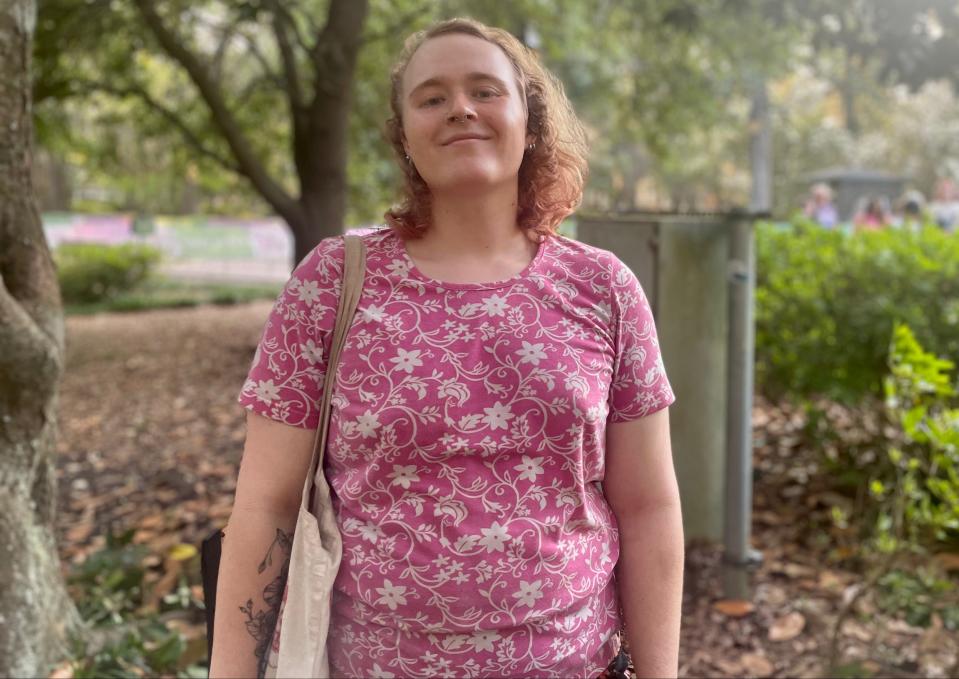
“There is quite literally scientific evidence showing that there's more harm that comes from not allowing people to access these things than there ever has been to show that you can be harmed from being able to access it,” Baker said of SB 140. “And the fact that our politicians can just blatantly disregard this is quite frankly disgusting, in my opinion. There's no oversight, no accountability, no ability for anybody to really vote no confidence, which I really, really feel like a lot of people would love to do, because it's just not right.”
Studies show that LGBTQ youth are placed at a higher risk of suicide because of mistreatment and stigmatization in society. According to The Trevor Project, a nonprofit focused on suicide prevention efforts among LGBTQ youth, 45% of LGBTQ youth seriously considered attempting suicide in 2022. In its annual survey on LGBTQ mental health, it found that nearly 1 in 5 transgender and nonbinary youth attempted suicide, and LGBTQ youth of color reported higher rates than their white peers.
"It feels as though we're being we are being targeted. Our community is being targeted." Appenzeller said. “Even a kid with a super supportive family who feels comfortable in their home life and comfortable in their school life with who they are, if they can't have access to that care, the amount of mental strain and upset that causes is so heavy.”
One speaker, a high schooler who identified herself as Magnolia, called out state Sen. Ben Watson, a Republican who sponsored SB 140. “Ben Watson is a representative of Chatham, Liberty and Bryan Counties,” she paused while the crowd booed. “How do you represent me, when you fear talking to me?”
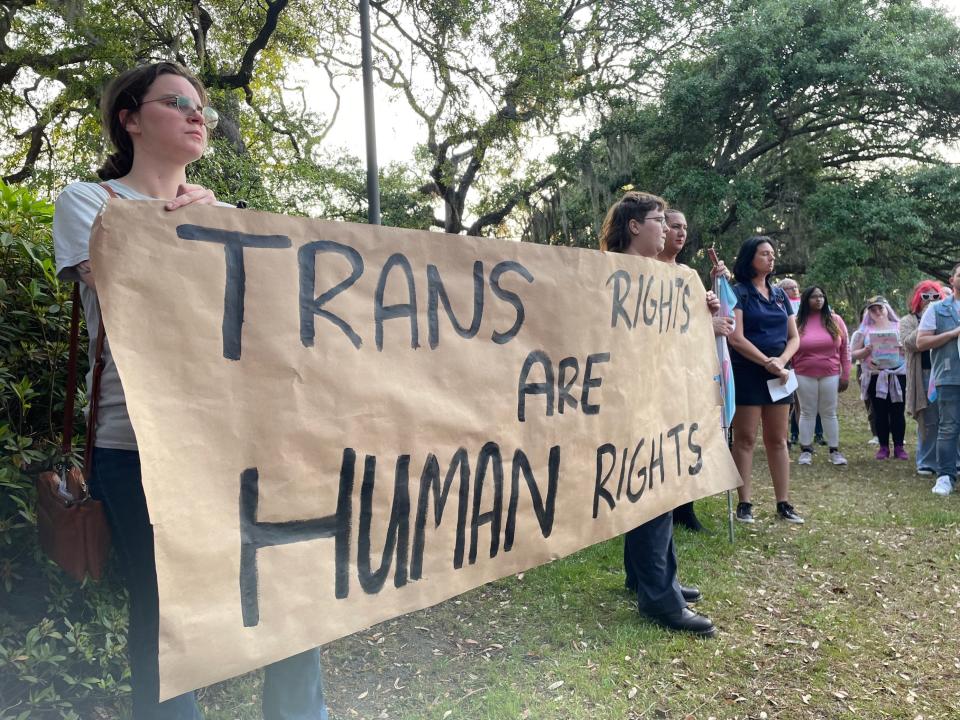
Sen. Watson (R-Savannah), a physician by trade, chairs the Senate Health and Human Services Committee. He emphasized that the focus of the law is to protect children with gender-affirming care such as continued mental health evaluations still in place while irreversible surgeries and hormone therapy are put on pause.
Watson said research on the bill and gender-affirming care included listening to parents, the youth and medical professionals. In that research, they found that the irreversible nature of the hormones and surgery has also been associated with depression and suicide.
“For the most part, you don't see much pushback relating to irreversible care on minors. Many parents, including those with transgender children and then later adults, have thanked us for doing legislation like this,” Watson said. “They felt as if it was something that they would have liked when they had their children in situations like this, so there really was not a lot of pushback from that perspective. It didn't make everyone happy by any means.”
Medical professionals have found that hard evidence on long-term outcomes for the rising numbers of people who received gender treatment as minors are weak. However different studies have found that statistics of those who have experienced regret ranges as low as 0.3% to 1%.
Watson referenced a British Medical Journal article where it states that more children and adolescents are identifying as transgender and are being offered medical treatment, especially in the US — but some providers and European authorities are urging caution because of a lack of strong evidence.
“If you look at the data and the compilation of data, both of the issues relating to depression anxiety, and suicidal thoughts, those pre and post, is very soft," Watson said. "They don't play up the folks who have regrets relating to these continued mental health issues that are not being addressed. I think that's where we are failing people."
Resources
The team at First City Pride Center is working on a youth resource directory with regional and local resources. The center also hosts a youth group that gives trans and nonbinary youth the opportunity to socialize and find peer support. Within that group, parents also meet to define peer support between parents.
“Please do not give up hope," Maclver urged. "A lot of people are fighting to get these types of laws overturned, and we can cross our fingers that soon there'll be a challenge in the courts. And we'll see what happens “
Laura Nwogu is the quality of life reporter for Savannah Morning News. Contact her at LNwogu@gannett.com. Twitter: @lauranwogu_
This article originally appeared on Savannah Morning News: Savannah GA LGBTQ speaks against Georgia bans on transgender care

